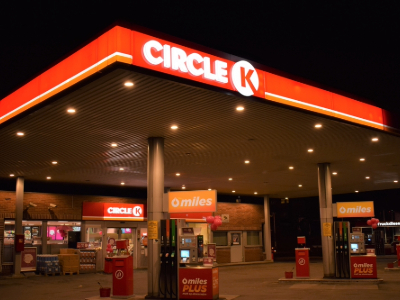Circle K, a global convenience store brand, has left an indelible mark on the retail landscape in Canada. The Circle K franchise system has become synonymous with convenience, providing a diverse range of products and services to consumers across the country. This overview delves into the history, key components, and success factors of the Circle K franchise system in Canada, shedding light on its evolution and its impact on the Canadian retail market.
I. Historical Context: Circle K’s Entry into Canada
Circle K made its entry into the Canadian market through the acquisition of the Couche-Tard convenience store chain in 2003. Couche-Tard, a Quebec-based company founded in 1980, had already established a strong presence in the Canadian convenience store sector. The acquisition marked the beginning of Circle K’s expansion into Canada, bringing with it a wealth of experience and a commitment to meeting the evolving needs of Canadian consumers.
II. Key Components of the Circle K Franchise System in Canada:
1. Diverse Product Offerings:
The Circle K franchise model in Canada revolves around providing a diverse range of products and services. Beyond traditional convenience store items, Circle K outlets offer fresh food options, beverages, snacks, and a variety of household necessities. This diversified product portfolio caters to the diverse needs of consumers and positions Circle K as a one-stop-shop for everyday essentials.
2. Franchisee Selection and Support:
The Circle K franchise system places a strong emphasis on selecting qualified and motivated individuals as franchisees. Prospective franchisees undergo a thorough selection process, and those selected receive comprehensive training and ongoing support. The support system covers various aspects, including store operations, marketing strategies, and adherence to Circle K’s brand standards.
3. Modern Store Design and Technology Integration:
Circle K stores in Canada boast modern and inviting designs that align with the brand’s image. The integration of technology is a key aspect of the franchise system, with Circle K leveraging digital solutions to enhance the customer experience. This includes digital payment options, loyalty programs, and efficient point-of-sale systems.
4. Adaptability to Market Trends:
The Circle K franchise system in Canada has demonstrated a keen ability to adapt to changing market trends. Whether it’s the introduction of healthier food options, eco-friendly initiatives, or technological advancements, Circle K stays attuned to consumer preferences and industry shifts, ensuring that its offerings remain relevant.
III. Success Factors and Innovations:
1. Global Best Practices:
Circle K’s success in Canada is rooted in its adherence to global best practices. The franchise system benefits from the experience and expertise gained through Circle K’s international operations. This includes leveraging successful strategies, implementing efficient supply chain management, and incorporating global innovations into the Canadian market.
2. Private Label Brands:
Circle K in Canada has introduced private label brands, offering a range of high-quality products under its own name. These private label items provide consumers with value-driven choices while allowing Circle K to differentiate itself in the market. The success of private label brands underscores Circle K’s commitment to meeting consumer demands for quality and affordability.
3. Acquisitions and Expansion:
Circle K in Canada has strategically expanded its footprint through acquisitions and organic growth. The acquisition of CST Brands in 2016 further strengthened Circle K’s presence in the Canadian market. The company’s growth strategy involves identifying opportunities for expansion, optimizing existing locations, and exploring new markets to enhance its market share.
4. Sustainability Initiatives:
With an increasing emphasis on sustainability, Circle K in Canada has implemented various initiatives to reduce its environmental impact. This includes energy-efficient store designs, waste reduction programs, and a commitment to responsible sourcing and recycling. These initiatives align with broader societal expectations for businesses to operate with environmental responsibility.
IV. Challenges and Adaptations:
1. Evolving Consumer Preferences:
The retail landscape is dynamic, with consumer preferences continually evolving. Circle K in Canada addresses this challenge by regularly reviewing and updating its product offerings, ensuring that it aligns with changing consumer preferences for convenience, health-conscious options, and sustainable choices.
2. Competition in the Convenience Store Sector:
The convenience store sector in Canada is competitive, with various players vying for consumer attention. Circle K stays competitive by focusing on differentiation through product innovation, customer service excellence, and strategic marketing initiatives.
3. Pandemic Response:
The COVID-19 pandemic presented unprecedented challenges for the retail industry. Circle K in Canada adapted quickly by implementing safety measures, ensuring store cleanliness, and enhancing its e-commerce and delivery services. This demonstrated agility and responsiveness to the changing needs of consumers during a challenging period.
V. Community Engagement and Corporate Social Responsibility:
1. Local Community Involvement:
Circle K in Canada actively engages with local communities through sponsorships, partnerships, and charitable initiatives. This involvement fosters a sense of community and positions Circle K as a responsible corporate citizen.
2. Charitable Contributions:
The franchise system contributes to charitable causes and community projects, reflecting a commitment to social responsibility. These initiatives often align with local priorities and address specific needs within the communities served by Circle K stores.
VI. Future Outlook and Conclusion:
The Circle K franchise system in Canada has emerged as a significant player in the convenience store industry. Its success is rooted in a commitment to diverse product offerings, a supportive franchise model, and adaptability to market trends. As it continues to navigate challenges, embrace innovations, and contribute to the communities it serves, Circle K in Canada is poised for sustained success in meeting the evolving needs of Canadian consumers. The franchise’s ability to balance global best practices with localized strategies exemplifies a formula for enduring success in the competitive and dynamic Canadian retail landscape.
For more information on how to find the right franchise investment in Canada, search the Buy a Canadian Franchise section here: https://buyacanadianfranchise.com/all-franchise-listings/
For more information on how to Franchise Your Business in Canada, contact FMS Franchise Canada: www.FMSfranchise.ca

